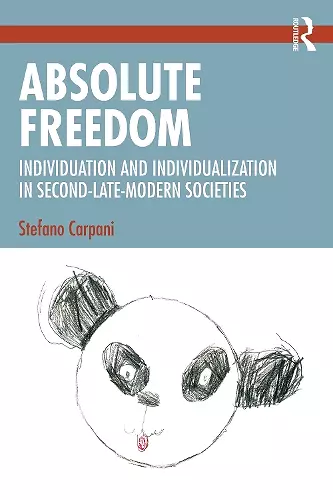Absolute Freedom
Individuation and Individualization in Second-Late-Modern Societies
Format:Paperback
Publisher:Taylor & Francis Ltd
Published:30th Jul '24
Currently unavailable, and unfortunately no date known when it will be back
This paperback is available in another edition too:
- Hardback£130.00(9781032487854)

Within this book, the fields of analytical psychology and sociology combine to examine and explore current social theory and the concept that the author has termed ‘absolute freedom’.
This work serves as a vital contribution to contemporary social and psychoanalytic research, unveiling the intricacies of psychological and social dynamics in our current epoch. Stefano Carpani explores the intersection of psychology and sociology, providing a fresh perspective beyond conventional boundaries. It conducts a comparative analysis of C. G. Jung's individuation process and Ulrich Beck's individualization theory, presenting the groundbreaking 'I+I' synthesis. This latter concept acts as a linchpin in deciphering self-identity narratives in the 21st century's dynamic landscape, before the author introduces the concept of absolute freedom, contextualizing it within the multifaceted complexities of contemporary second-late-modern existence.
This compelling new book will be of great interest to academics, scholars and students in the fields of analytical psychology, sociology and psychosocial studies.
‘Carpani makes an important contribution to contemporary psychosocial theory from a Jungian perspective. It will be of wider interest to clinicians, activists, and theorists as they continue the debate about how the world makes us.'
Susie Orbach, Psychoanalyst, writer and social critic, UK
‘By opening a dialogue between Jung's psychological notion of individuation and Ulrich Beck's sociological notion of individualization, Stefano Carpani has created a foundational bridge that will bear fruitful insights for generations to come. Carpani has single handedly established an I-thou relationship between the work of Jung and Beck that is a major breakthrough and achievement for both traditions in the notion of "relational psychosocial studies.'
Thomas Singer, Psychiatrist and Jungian Psychoanalyst, USA
‘In this much-needed commentary on individuation and individualism, Stefano Carpani has clarified the theoretical and clinical issues surrounding Jung’s and Jungians’ use of individuation as the ideal goal of human development. By blending sociological and psychoanalytic perspectives into a nuanced and precise relational model, Carpani helps us understand the demands on human identity in our late late-modern era. As a result, psychoanalytic clinicians and theorists can distinguish between the suffering of identity pathologies from ordinary existential stresses of late-modern identity development. I strongly recommend this very useful treatise.'
Polly Young-Eisendrath, Author, Jungian Psychoanalyst, and Zen Buddhist, USA
‘Carpani has emerged as a leading figure among a new generation of Jungian analysts and theoreticians. His Individuation, Individualization, and Absolute Freedom stands as a singular contribution to the growing sense of Jung’s significance in the 21st Century. While the book focuses on the relationship between Jung’s theory of individuation, and Ulrich Beck’s analysis of individualization in late modernity, Carpani’s masterful command of the sociological literature, as well as the work of Jung and the post-Jungians promises to move our understanding of depth psychology’s place in the larger cultural and political world in new and creative directions. With implications that reach well beyond analytical psychology, this book is highly recommended.'
George B. Hogenson, Jungian Psychoanalyst, past-vice-president IAAP, USA
‘With this work Stefano Carpani wants to build a bridge from sociology to psychoanalysis, from Beck with his principle of individualization as a main characteristic of our time to the individuation process of C. G. Jung, a lifelong process of transformation, involving conscious and unconscious influences, leading to a transitional identity: The merger of 'I+I'., how Stefano Carpani calls his theory. Does it bring us new insights? A relational psychosocial approach - to understand the developments of the narratives of self-identity today, leading to the "Absolute" freedom. Absolute freedom understood by Carpani as psychic and social freedom from the influences of authorities – in individual psychologically understood as freedom from the constellated complexes. This main thesis of this book is an interesting and long-overdue consideration: It is self-evident that we all live in social relations, that society has an influence on us, and that there is a reciprocal effect between the social world and our psychic inner world. But these ideas have been given far too little attention in the relevant theories until now. It is the merit of this work of Carpani to change that. Interesting and thought-provoking is the direction of his thoughts: from today's current individuation as described by Beck back to the individuation of C.G. Jung. This basic idea of Carpani is broadly underpinned by the theories of Beck and Jung, by further diverse sociological and psychoanalytical theories. By presenting a clinical case Carpani shows himself as a clinician who builds a bridge from his work as a clinician to his theory ‘I+I'. Lots of ideas, references and approaches in this book are stimulating, and above all they encourage further questions. An important field of mutual psychosocial influences is opened.'
Verena Kast, Jungian Psychoanalyst and past-president IAAP and the CGJIZ, CH
ISBN: 9781032487847
Dimensions: unknown
Weight: 420g
170 pages